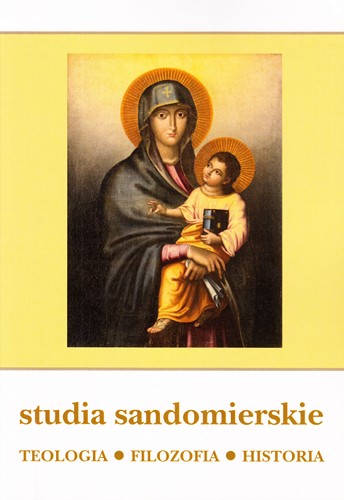Getting to Know Scheler
DOI:
https://doi.org/10.15633/sts.3870Keywords:
M. Scheler, ethics, axiologyAbstract
The article is a retrospective look at the process of getting to know the life and work of a well-known German intellectual Max Scheler (1874–1928), a pioneer in phenomenology, ethics, and philosophical anthropology. The paper covers a biographical synthesis with an emphasis put on the problematic elements of the life of the German philosopher, an attempt to synthesize Scheler’s intellectual achievements in the light of various publications devoted to his works and ideas, and a critical analysis of his work entitled Der Formalismus in der Ethik und die materiale Wertethik (1916), which up to this day has not been fully translated into Polish. The subject of this reflection is to show the intuitive dissonance between what Scheler wrote and taught and how he lived, while its purpose is to demonstrate it. This seems to be an important issue, especially in the context of ethics and axiology that claim to have the right to formulate rules binding on every individual.References
Opracowania
Baranowska M.M., Bóg w myśli Schelera, Kraków 2011.
Brejdak J., Fenomen wczucia według Maxa Schelera i Edyty Stein, w: Edyta Stein. Fenomenologia getyńsko-monachijska. Analizy, red. J. Machnacz, K. Serafin, Wrocław 2015, s. 186–196.
Cicero M.T., Epistularum ad familiares, ks. V, http://www.thelatinlibrary.com/cicero/fam5.shtml#5 [dostęp: 11 II 2020 r.].
Galarowicz J., Max Scheler, Kraków 2019.
Hildebrand A. von, Dusza lwa. Biografia Dietricha von Hildebranda (1889–1977), tłum. J. Franczak, Warszawa–Ząbki 2008.
Mazur G., Struktura bytowa człowieka w ujęciu Maxa Schelera, „Colloquia Theologica Ottoniana” 1 (2015), s. 89–106.
Prokop A.R., Eurofilozoficzny kontekst katolickich konwersji pośród fenomenologów, w: Edyta Stein. Europa i jej tożsamość, red. J. Machnacz, T. Marcinów, K. Serafin, Wrocław 2017, s. 50–63.
Scheler M., Christentum und Gesellschaft, półtom 1, Konfesionnen, Leipzig 1924.
Scheler M., Der Formalismus in der Ethik und die materiale Wertethik. Neuer Versuch der Grundlegung eines ethischen Personalismus, Halle a.d. Saale 1916.
Scheler M., Die Stellung des Menschen im Kosmos, Darmstadt 1928.
Scheler M., Pisma z antropologii filozoficznej i teorii wiedzy, tłum. A. Węgrzecki, Warszawa 1987.
Scheler M., Wolność, miłość, świętość, tłum. G. Sowiński, Kraków 2004.
Scherer G., Strukturen des Menschen. Grundfragen philosophischer Anthropologie, Essen [1976].
Schopenhauer A., Die Kunst recht zu behalten, Berlin 2019.
Tatarkiewicz W., Historia filozofii, t. 3, Historia XIX w. i współczesna, Warszawa 1950.
Uliński M., Scheler, Max, w: Filozofowie współcześni. Leksykon, red. J. Szmyd, Bydgoszcz–Kraków 2003, s. 440–444.
Valverde C., Antropologia filozoficzna, tłum. G. Ostrowski, Poznań 1998.
Węcławik P., Antropologia filozoficzna Maxa Schelera: jej geneza, przedmiot i metoda, „Folia Philosophica” 16 (1998), s. 103–113.
Węgrzecki A., Scheler, Max, w: Powszechna encyklopedia filozofii, t. 8, red. A. Maryniarczyk, Lublin 2007, s. 941–943.
Węgrzecki A., Struktura człowieka w ujęciu Maxa Schelera, „Studia Filozoficzne” 15 (1971) nr 6 (73), s. 45–62.
Zimmermann A., Der Mensch in der modernen Philosophie, Essen 1975.
Downloads
Published
Issue
Section
License
Copyright (c) 2021 Adam R. Prokop

This work is licensed under a Creative Commons Attribution-NonCommercial-NoDerivatives 4.0 International License.
Authors who publish with this journal agree to the following terms:
- Authors retain the copyright and full publishing rights without restrictions, and grant the journal right of first publication with the work simultaneously licensed under a Creative Commons Attribution 4.0 International License that allows others to share the work with an acknowledgement of the work's authorship and initial publication in this journal.
- Authors are able to enter into separate, additional contractual arrangements for the non-exclusive distribution of the journal's published version of the work (e.g., post it to an institutional repository or publish it in a book), with an acknowledgement of its initial publication in this journal.
- Authors are permitted and encouraged to post their work online (e.g., in institutional repositories or on their website) prior to and during the submission process, as it can lead to productive exchanges, as well as earlier and greater citation of published work (See The Effect of Open Access).

